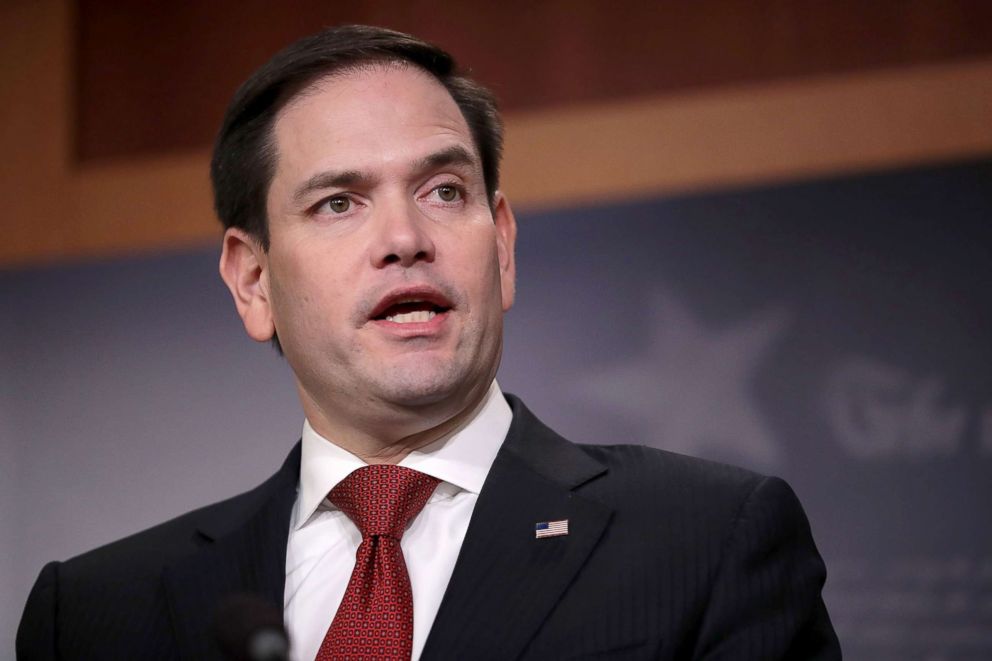Lawmakers urge Trump to respond to Syria attack but divided on how
Some Democrats and Republicans want Congress to authorize any use of force.
As President Donald Trump gives a time frame for his decision on how he will respond to the Assad regime’s latest alleged use of chemical weapons on its own people, lawmakers are urging Trump to act, but so far are divided on what he should actually do.
Several senators issued statements saying Trump should hold both Bashar al-Assad and his foreign backers accountable after an alleged attack over the weekend in the Damascus suburb of Douma, but did not detail the specific actions he should take.
“The world must hold Assad and his enablers in Russia and Iran responsible for this,” Sen. Marco Rubio, R-Fla., said.

"As the sparrow cannot fall without the Father, so too Assad cannot launch chemical attacks without Iran and Russia. All three should pay for their barbarism," the statement from Sen. Tom Cotton, R-Ark., read.
Others condemned the president for not laying out a more specific strategy on Syria earlier, saying his nominee for secretary of state, Mike Pompeo, should be prepared to explain it more fully when he testifies before the Senate Foreign Relations Committee Thursday during his confirmation hearing.
Pompeo’s predecessor, Rex Tillerson, gave a speech in January on Syria in which he suggested the U.S. would maintain an open-ended presence in Syria, but with few details on what it would look like or what the goals were.
“During his upcoming hearing, I expect Secretary of State-nominee Pompeo to articulate an actual policy for Syria,” the top Democrat on the committee, Bob Menendez, said in a statement.

Trump said he would make “some major decisions” on Syria within the next 24 to 48 hours. In late March he said the U.S. would be leaving the country entirely “very soon,” before walking those remarks back.
But several members of both parties criticized him for signaling a hasty withdrawal. Sen. John McCain, R-Ariz., delivered the harshest condemnation, saying Assad was “emboldened” by American inaction and urging Trump to respond as he did last April after a similar chemical weapons attack when he launched targeted airstrikes on the airfield where the attack was launched.
Like several other senators, McCain applauded Trump for slamming Russia and Iran on Twitter after the attacks but said that should only be the first step.
“President Trump was quick to call out Assad today, along with the Russian and Iranian governments, on Twitter. The question now is whether he will do anything about it,” McCain said.
A few Democrats joined McCain’s call for more airstrikes against the Assad regime.
“I thought that President Obama, when he set the red line and then they attacked with chemical weapons, that the U.S. should have taken action then, and I do so now as well,” Sen. Bill Nelson, Fla., said, referring to President Barack Obama’s 2012 pledge of action if Assad was confirmed to have used chemical weapons, which he never followed through on.
A core bipartisan group of senators has also long called for Congress to consider a new Authorization for the Use of Military Force (AUMF) that would specifically govern the United States’ involvement in Syria. The administration is still operating on a decade-plus-old AUMF passed in response to the September 11, 2001, terrorist attack.
Sens. Tim Kaine, D-Va., and Jeff Flake, R-Ariz., authored an AUMF last year specifically geared towards the fight against ISIS, al Qaeda and the Taliban. Kaine also responded after Trump approved airstrikes against pro-Assad forces in February of this year, urging more congressional oversight.
“I am gravely concerned that the Trump Administration is purposefully stumbling into a broader conflict, without a vote of Congress or clear objectives,” he said at the time.
After the weekend’s attack, Sen. Mike Lee, R-Utah, reiterated that desire.
“The use of chemical weapons absolutely requires a response from the United States,” Lee said. "But if that response is going to include military force, the President of the United States should come to Congress and ask for authorization before military force is used."




